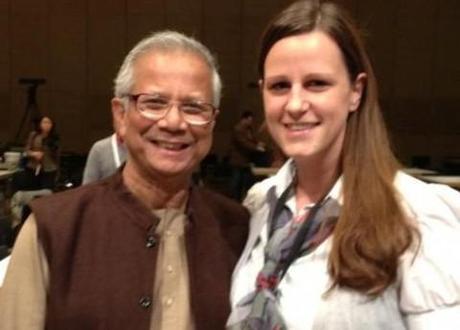
Patti Kurz with Muhammad Yunus, the father of microfinancing. Photo credit: Patti Kurz
When I tell people that I’m studying for a Master in Social Entrepreneurship, the reaction is always the same – a confused look and a safe answer of “interesting” or “good for you”, letting me know they have no idea what that means.
The truth is that I was as confused as you probably are in understanding the growing field of social entrepreneurship, and I want to share with you why I’m moving into this field, why it’s important, and what you can do to get involved.
While I have a lot of experience working with non-profits, my professional career has been primarily in private business. By working with two very different sectors, I have been able to see a lot of the good (and bad) of what each brings to our communities – much needed social services from the non-profits and robust corporate social responsibility (CSR) programs from the corporations. I found myself getting frustrated with both – the non-profits I worked with were always looking for money and often lacking in business expertise and the corporations were focused on making money, with a CSR committee as a feel-good initiative for the company.
I saw a huge potential in bridging the gap between the two, and after a bit of research, I found the best solution that exists right now: social entrepreneurship. It’s not about just doing things that make you feel better but coming up with real and sustainable solutions for anything from fundraising to international (and national) development to creating new business models that do more than just make a profit.
I’m admittedly still figuring out all of the ways that social entrepreneurship can work, but here are a few thoughts on my interpretation of what it means and why it’s important:
- To address the needs of the community, start with a community-mindset. Bring together all industries and players, from entry-level to CEO, to come up with real solutions that will work for everyone.
- Innovation is key, and it doesn’t always mean doing something new. There are many amazing ideas out there, and sometimes the innovation we need is keeping it simple and revisiting something that may not have worked before.
- Any sector can create sustainable business solutions, even non-profits. Honestly, who likes to fundraise? It’s stressful to ask people for money, and it’s even more stressful to know how many non-profits are struggling in these economic times due to budget cuts. It’s not likely that fundraising will disappear, but we have to start thinking of solutions now.
- Profit is not a bad word. There is an opportunity to redefine what profit can mean, such as the triple-bottom-line (Profit+People+Planet) business model and other models that include elements of social betterment.
It’s not perfect. Since this is such a new and growing field, there are still many kinks to work out, and you might fail. The good news is that everyone can get involved in social entrepreneurship. Start educating yourself on what is happening in this field. Find ways to incorporate it into your job, school, volunteer group, etc. Focus on something that really bothers you and think of a way to actually fix it.
A few growing social enterprises that are doing great things include:
• Social Innovation Camp, which brings together ideas, people and digital tools to build web-based solutions to social problems.
• Food Cycle combines volunteers, surplus food and a free kitchen space to create nutritious meals for people affected by food poverty in the UK and positive social change in the community.
• FoundInTown, a community-based lost and found program that creates an easy way to facilitate returning lost items to their owners. FiT operates through a network of local bars and nightclubs committed to helping out the members of their community.
• DoTheGlobe, an online c2c community marketplace connecting travelers and unique experiences.
As for me, I’m trying to learn all I can about this field so I can find where to make my mark on the world. In addition to academia, I’ve attended field-relevant conferences and have been interning with an international social enterprise, Partners for Youth Empowerment (PYE) Global, to explore ways to scale the organization. I’ve participated in business case competitions and am developing my own innovative ideas into business plans I hope to implement one day. I’m learning all that I can about this field, making myself more aware of the problems I want to address and the ways we can make it happen.

